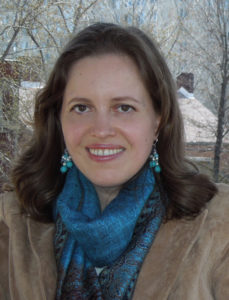by Huan Xu
 The first time I met Yulia was in 2015 when I visited Dr. Brian Popko’s laboratory to finalize my rotation. She smiled at me and said: “Whenever you have a question, you can come to me.” I thought her words were probably just a hint of her being a nice and polite senior postdoc in Dr. Popko’s laboratory. However, it turned out she really meant it. Since 2015, Yulia has become my role model, my best lab mate, and best friend. She is one of the few people I met who refresh my mind to look and experience the world differently.
The first time I met Yulia was in 2015 when I visited Dr. Brian Popko’s laboratory to finalize my rotation. She smiled at me and said: “Whenever you have a question, you can come to me.” I thought her words were probably just a hint of her being a nice and polite senior postdoc in Dr. Popko’s laboratory. However, it turned out she really meant it. Since 2015, Yulia has become my role model, my best lab mate, and best friend. She is one of the few people I met who refresh my mind to look and experience the world differently.
A doctor found her real passion.
I was surprised to learn that Yulia had a rather unconventional career path. She completed her Ph.D. training at New York University School of Medicine, in the laboratory of Dr. James Salzer, where she studied mechanisms of node of Ranvier formation. Throughout her academic training, she has maintained a broad interest in the medical sciences, fascinated by cellular and molecular processes underlying various pathologies. In pursuit of clinical science knowledge, after receiving her Ph.D. in Neuroscience and Physiology, she obtained an M.D. from the University of Rochester School of Medicine and completed a year of internship training. It was at this point that she decided to exit medicine and focus on a research career. When I asked Yulia what inspired her to change her career path from a medical doctor to a scientist, she said: “Being a doctor was a wonderful opportunity to learn about various disease processes and to use this knowledge in a clinical setting. However, I missed working in a research laboratory and the creative process of scientific discovery. Although I embarked on this journey thinking of a career that combines clinical practice and research, over the years of medical training my interests evolved to focus on investigating biological questions that have clinical relevance.”
A scientist wants to understand neurodegenerative diseases.
Following her passion, Yulia started her postdoctoral fellowship training in Dr. Brian Popko’s laboratory at the University of Chicago, where she received NIH NINDS F32 postdoctoral fellowship. Yulia’s postdoctoral research is focused on investigating the roles of an innate protective mechanism, called the integrated stress response, in mouse models of multiple sclerosis (MS) and amyotrophic lateral sclerosis (ALS).
I asked Yulia about some of the new trends happening in her research areas of interest. She said: “Identification of novel therapies to protect oligodendrocytes against the inflammatory CNS environment will be a significant accomplishment for alleviating MS. To this end, our research group (led by Dr. Brian Popko) has demonstrated that pharmaceutical enhancement of the integrated stress response alleviates clinical symptoms and increases oligodendrocyte survival in mouse models of MS, thus providing support for exploring this pathway as a novel treatment strategy.” While there are many new research avenues to facilitate ALS drug development, she is especially excited about ‘designer DNA drug’ therapy (antisense oligonucleotides) developed by Dr. Don Cleveland’s team at the University of San Diego. This therapy involves the infusion of antisense DNA oligonucleotides for targeted gene silencing in the nervous system. The initial clinical trial in ALS demonstrated the safety of this therapeutic approach, and follow-up trials are underway.
A mentor passes her experience to young students.
As an MD/Ph.D., Yulia has a broad knowledge base in medicine and sciences, and she is very generous to share her experience and advice with people around her. She suggests students identify a mentor (or mentors) early in their career. “Both science and medicine are very much hands-on specialties, and nuances of either profession cannot be learned from books alone. Thus, good mentorship cannot be underestimated,” Yulia said. She fondly recalls her own postdoc mentors at New York University School of Medicine (where she was a graduate student), as they taught her everything she needed to know about molecular neurobiology. Now having completed her own training, she strives to follow in the footsteps of her mentors. “I enjoy mentoring undergraduate students in our laboratory. I teach my students both the technical aspects of research, such as how to run immunohistochemistry or quantitative PCR experiments, as well as experimental design and critical data analysis. This experience has been very rewarding.”
Reflecting on her journey in medicine and biological sciences, Yulia said: “I really enjoy what I am doing and I would choose the same path if I were given another chance.” Seeking and courageously following her professional interests, Yulia is on her way to achieving her long-term career goal as a principal investigator to advance the understanding of neurodegenerative diseases. Having seen Yulia’s passion for science, and how she passes her knowledge and hands-on experience to her students, I genuinely feel it’s such a blessing for the people around her to work with her, learn from her, and be inspired by her.
